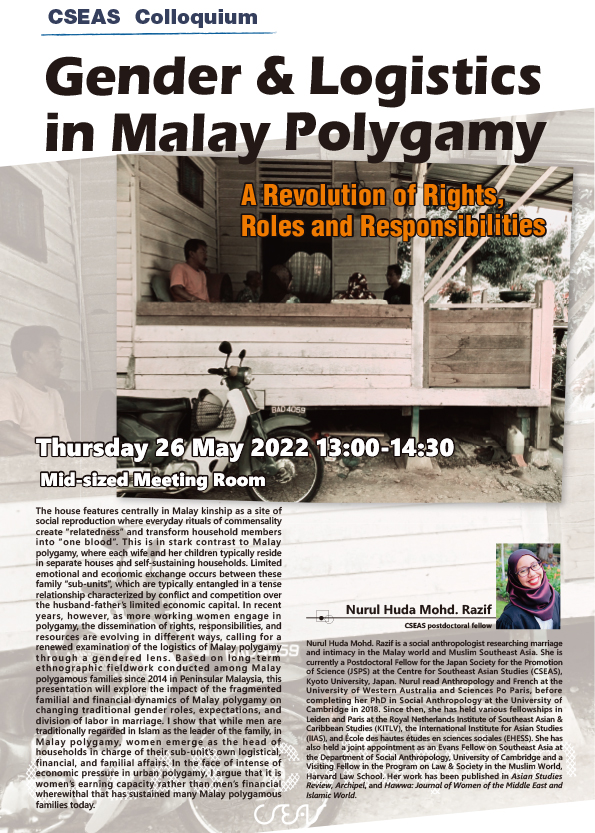Date & Time: Thursday 26 May, 2022, 13:00-14:30
Venue: Middle-sized Meeting Room, 3F,
Inamori Foundation Building, Kyoto University
Title: Gender & Logistics in Malay Polygamy: A Revolution of Rights, Resources & Responsibilities
Speaker: Nurul Huda Mohd. Razif
Abstract:
The house features centrally in Malay kinship as a site of social reproduction where everyday rituals of commensality create “relatedness” and transform household members into “one blood”. This is in stark contrast to Malay polygamy, where each wife and her children typically reside in separate houses and self-sustaining households. Limited emotional and economic exchange occurs between these family “sub-units”, which are typically entangled in a tense relationship characterized by conflict and competition over the husband-father’s limited economic capital. In recent years, however, as more working women engage in polygamy, the dissemination of rights, responsibilities, and resources are evolving in different ways, calling for a renewed examination of the logistics of Malay polygamy through a gendered lens. Based on long-term ethnographic fieldwork conducted among Malay polygamous families since 2014 in Peninsular Malaysia, this presentation will explore the impact of the fragmented familial and financial dynamics of Malay polygamy on changing traditional gender roles, expectations, and division of labor in marriage. I show that while men are traditionally regarded in Islam as the leader of the family, in Malay polygamy, women emerge as the head of households in charge of their sub-unit’s own logistical, financial, and familial affairs. In the face of intense of economic pressure in urban polygamy, I argue that it is women’s earning capacity rather than men’s financial wherewithal that has sustained many Malay polygamous families today.
Bio:
Nurul Huda Mohd. Razif is a social anthropologist researching marriage and intimacy in the Malay world and Muslim Southeast Asia. She is currently a Postdoctoral Fellow for the Japan Society for the Promotion of Science (JSPS) at the Centre for Southeast Asian Studies (CSEAS), Kyoto University, Japan. Nurul read Anthropology and French at the University of Western Australia and Sciences Po Paris, before completing her PhD in Social Anthropology at the University of Cambridge in 2018. Since then, she has held various fellowships in Leiden and Paris at the Royal Netherlands Institute of Southeast Asian & Caribbean Studies (KITLV), the International Institute for Asian Studies (IIAS), and École des hautes études en sciences sociales (EHESS). She has also held a joint appointment as an Evans Fellow on Southeast Asia at the Department of Social Anthropology, University of Cambridge and a Visiting Fellow in the Program on Law & Society in the Muslim World, Harvard Law School. Her work has been published in Asian Studies Review, Archipel, and Hawwa: Journal of Women of the Middle East and Islamic World.
